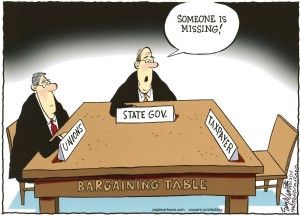In a tribute to Labor Day, the California Teachers Association has put up a slobbering web page as a paean to the labor movement. Its unintentionally humorous title is “Organized Labor – Proud and Free.”
Free?
Actually, it is very costly. Here in California, a non-right-to-work state, teachers must fork up over $1,000 a year in order to work in a public school. (They can pay a little less if they choose not to support the union’s political agenda.) And all teachers are forced to be a part of the collective bargaining (CB) unit.
Collective bargaining, a term first introduced into the lexicon by socialist Beatrice Webb in 1891, is a process of negotiations between employers and employees aimed at reaching agreements that regulate working conditions. The workers are commonly represented by a union, and the agreements reached by this arrangement set wage scales, working hours, teacher training, etc.
It sounds like a good deal for teachers, but is it?
“Exclusive representation” (more accurately, monopoly bargaining) privileges are the source of compulsory union power.
Handed to union officials by Congress in the National Labor Relations Act, monopoly bargaining gives union kingpins the leverage to herd workers into unions and then force them to pay union dues.
Under federal law, if union organizers win a representation election by even 50% plus one of those voting, they are empowered to negotiate contracts on behalf of all 100% of the workers. In fact, under some circumstances, union officials become monopoly “representatives” even when most workers are against them! And by law each and every worker loses his or her right to negotiate directly with the employer on his or her own behalf.
So problem #1 with CB is that teachers are forced to go along with the 50 percent plus one even if they would rather negotiate their own contacts.


